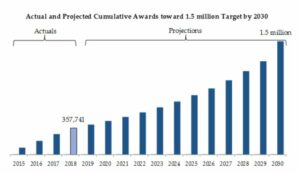
Hiding the silver lining deep in a grey cloud, the State Council of Higher Education for Virginia reported today that Virginia is meeting its educational attainment goals to date and is on track to meet its aggressive 2030 higher education target.
That good news was mentioned briefly and detailed in a footnote, in an otherwise-gloomy report (here) headlined “The Cost of Doing Nothing” and highlighted in a news release as “an urgent call to increase Virginia’s educational attainment.” Never let good news stand in the way of a crisis. The sentence that mentions the projection of success is followed by: “But warning signs are flashing,” in boldface.
Last year the state’s public and private institutions issued more than 120,000 degrees, certificates and workforce credentials, at the undergraduate and graduate levels, the pace needed to reach the 1.5 million needed over 16 years. There are two other very positive recent developments for higher education in Virginia – the success of this year’s General Assembly effort to arrest tuition increases and additional investment in targeted tech-related programs promised to lure Amazon’s HQ2 to Northern Virginia.
The headline goal of the state’s higher education strategic plan is to make our workforce the best educated in the country, with 70 percent having some sort of degree or work-related certificate earned beyond high school by 2030. Virginia was already doing well in that measure, sixth in the nation at 52 percent in 2016, when the goal was set.
In the midst of this success, SCHEV focuses on a series of concerns:
- The higher education attainment is focused mainly in Northern Virginia and other areas of economic strength, with rural areas deeply lagging, the “Rest of Virginia” or ROVA effect. That’s not unique to Virginia, but “the difference between the rates of educational attainment in Virginia’s highest-performing and poorest-performing localities is the widest in the nation,” the report claims.
- Racial disparities, with far lower degree and certificate achievement among “our minority (non-Asian) population.”
- Additional factors include enrollment decline, net out-migration among degree holders, resource constraints, and complacency.
So, having just seen on page 3 that the first four years of the plan are going well, and the numbers to-date indicate future success, on page 5 we find: “Without meaningful change, Virginia will not become the best-educated state by 2030 (or any other year). Given current trends, policies and lack of action, some have proclaimed, astutely, “We can’t get there from here.” This is an unacceptable outcome. So, who would be those “some” people?
SCHEV is a data-happy organization, as it should be. The data behind the claims that Virginia has the most geographic disparity in the country and claims that early success to-date is going to be crushed by the fears outlined should have been included in the report. It is lacking. All I found were the somewhat predictable calls for a number of steps which have long been discussed, the most useful including:
- Concentrate resources on helping students with some credits in place to return to school and finish the program.
- Concentrate internal support and guidance programs on students struggling to succeed, to ensure they stay the course and complete.
- Improve and increase participation in formal early childhood education programs, addressing the early performance gaps that can set in place long before the students reach secondary grades.
Virginia is not doing nothing and to imply so is an insult to a vast group of dedicated people, including members of the General Assembly. Faced with facts at hand, the instigators of this report could have seen the half-full glass, praised efforts to date for getting Virginia on track, and sought to reinforce those efforts.
If the glass really is half-empty and draining, this report fails to make the case. Show us more data. No question, there are bumps in the road ahead between now and 2030, but are we failing?
The single biggest impediment to success, the 800-pound gorilla this report only hints at, is the skyrocketing cost and crushing debt that stands between the average Virginian and that state-university degree. Yet another guest editorial in the Richmond Times-Dispatch, this one by retired public relations executive David Kirby, outlined the problem well this morning. “Mass mugging,” he calls it.
A possible second major impediment to success, hinted at in the report, may be that economic malaise is behind the net out-migration statistics, with talented young people leaving the state for perceived greater opportunity. The Amazon announcement and its prospects should have an impact on that, but it will also exacerbate that regional disparity complained of.
The relationship between Virginia’s economic prospects and the educational success of its workforce is truly like that chicken and that egg, and it really doesn’t matter which succeeds – or fails – first. So far the educational goals are being met.

Leave a Reply
You must be logged in to post a comment.